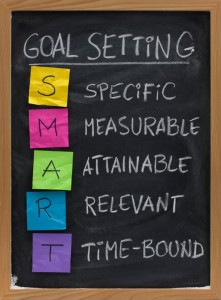The difference between a dream and a goal is a plan.
We all have goals, right? Unfortunately, some goals are harder to achieve than others, and these goals are usually the ones that are the most important to us.
“I want to lose weight” is an example of a very common goal. It’s one of the top New Year’s Resolutions every single year.
So why is this goal (and others like it) so hard to achieve? The main reason is this type of goal is not a SMART goal. It’s too vague and open-ended. It’s a really nice wish, but the chances of making this wish into a reality are pretty slim.
In order to be considered SMART, a goal must have these five components:
Goals are NOT intended to be empty “righteous works”, they are “training offerings” to God.
Specific
A specific goal has a much greater chance of being accomplished than a general goal. To set a specific goal you must answer the six “W” questions:
- Who: Who is involved?
- What: What do I want to accomplish?
- Where: Identify a location.
- When: Establish a time frame.
- Which: Identify requirements and constraints.
- Why: Specific reasons, purpose or benefits of accomplishing the goal.
Measurable
Decide how you will measure progress toward the attainment of each goal you set.
When you measure your progress, you stay on track, reach your target dates, and experience the exhilaration of achievement that spurs you on to continued effort required to reach your goal.
How will I know when it is accomplished?
Attainable
Be realistic. Set a goal that you know you can achieve.
Example: If you have never read your Bible regularly, don’t commit to reading every day for one hour. That’s not realistic. Perhaps you could read one chapter per day. That will usually take less than 10 minutes.
While an attainable goal may stretch you in order to achieve it, the goal should not be extreme.
How will the goal be accomplished?
Relevant
Chose goals that matter. A bank manager’s goal to “Make 50 peanut butter and jelly sandwiches by 2:00pm” may be specific , measurable, attainable, time-bound and hilarious, but lacks relevance.
You were designed to live in community. You will need support to accomplish a goal. Who is your Barnabas? Who is your Paul? If you do not have these people in your life, ask someone at your table and/or join a community group at Sandals.
Questions to help with this are…
- Goals that are relevant will receive that needed support.
- Does this seem worthwhile?
- Is this the right time?
- Does this align with other efforts/needs?
- Am I the right person for this?
Timely
A goal should be grounded within a time frame. With no time frame tied to it, there’s no sense of urgency. If you want to lose 10lbs, when will you lose it by? “Someday” won’t work. But if you anchor it within a time frame, “by March 1st”, then you’ve set your mind into motion to begin working on the goal.
Questions to help with this are…
- When?
- What can I do six months from now?
- What can I do one month from now?
- What can I do today?

